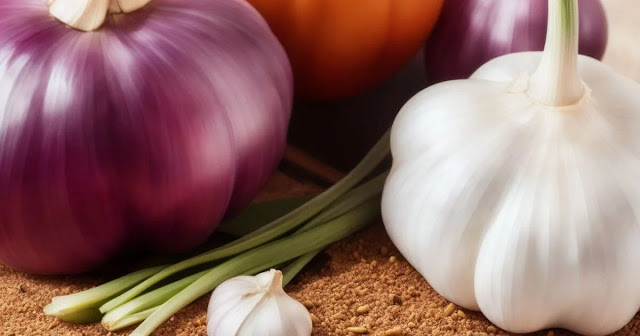If you have ever spent time in the kitchen, chances are you have come across garlic which pungent and flavorful ingredient. But have you ever wondered whether garlic is a fruit or a vegetable? This seemingly simple question has puzzled many curious minds. In this comprehensive article, we will discuss about is garlic a fruit or vegetable and gastronomy to uncover the truth behind garlic's classification.
Is Garlic a Fruit or Vegetable?
Garlic is a vegetable. It belongs to the Allium genus and is branded
by its bulbous structure composed of individual cloves. In culinary terms,
vegetables encompass a broader category of eatable plant parts used in cooking
and garlic perfectly fits this definition. Its pungent flavor and common use in
savory dishes make it a valuable and versatile vegetable in various cuisines
worldwide.
Understanding Botanical Classification
To determine whether is garlic a fruit or vegetable? We first need
to understand the principles of botanical classification. In fruits and
vegetables are not used in the same context as in culinary terms. Fruits are
the mature ovaries of flowering plants which contain seeds, while vegetables
encompass a broader category, including various plant parts that are used in
cooking.
Botanical Definition of Fruits
According to botanists, fruits grow from the fertilized flowers of a plant and are responsible for protecting and dispersing seeds. They form from the ovary of the flower after pollination. Based on this definition, fruits come in many forms, such as berries, drupes and capsules.
Culinary Perspective of Fruits
In culinary terms, fruits are sweet or savory products which are
often consumed raw as snacks and desserts. Examples of common culinary fruits
include apples, oranges and strawberries. However, garlic does not fit into
this category due to its pungent flavor and common use as a cooking ingredient.
Botanical Definition of Vegetables
Unlike fruits, vegetables encompass a wider array of edible plant
parts, including roots, stems, leaves and flowers. Vegetables can be further
divided into categories such as leafy greens, tubers and bulbs, where garlic finds
its place.
Culinary Perspective of Vegetables
From a culinary standpoint, vegetables are usually savory and play a fundamental role in cooking. They improve flavor, texture and nutrients to dishes. Common vegetables include spinach, carrots and onions, which share similarities with garlic in their culinary applications.
Garlic's Botanical Features
Garlic (Allium sativa) belongs to the Allium genus and is part of
the Amaryllidaceous family. It is a bulbous plant measured by its subversive
bulb, comprised of multiple cloves. Each clove is covered with a papery skin
and contains the complex allicin, accountable for garlic's distinctive aroma
and flavor.
Garlic is a Vegetable
Now that we have explored the botanical and culinary definitions, we can surely state that garlic is, indeed, a vegetable. As it fits the criteria of a vegetable in both contexts, we can conclude which garlic's classification aligns with other well-known vegetables like onions and shallots.
Health Benefits of Garlic
Beyond its culinary uses, garlic has been respected for its
medicinal possessions for centuries. It is believed to have various health
benefits, including its potential to boost the immune system, reduce blood
pressure, and improve heart health. The compound allicin found in garlic is credited
to many of these beneficial effects.
Culinary Uses of Garlic
Garlic is an indispensable ingredient in kitchens worldwide. It
adds depth and complexity to an array of dishes, ranging from pasta and
stir-fries to soups. Roasted garlic, with its milder taste, is a delightful
spread for bread, while raw garlic is used meanly in dressings and dips.
Growing Garlic at Home
For those with a green thumb, growing garlic at home can be a
rewarding experience. Garlic can be effortlessly advanced in well-draining soil
with plenty sunlight. Planting individual cloves in the fall allows the plant
to establish itself before winter, resulting in a generous harvest in the
following summer.
Conclusion
Garlic is absolutely a vegetable, both from a botanical perspective and in culinary applications. Its characteristic taste and numerous health benefits make it a valued element in various cuisines. Whether used in hearty stews or as a tangy seasoning, garlic continues to hold a significant place in the culinary world.



.webp)
.webp)

0 Comments